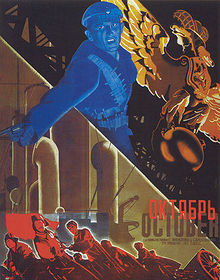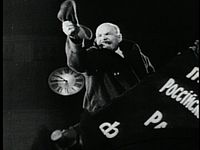- October: Ten Days That Shook the World
-
October:
Ten Days That Shook the World
Film posterDirected by Grigori Aleksandrov
Sergei EisensteinWritten by Grigori Aleksandrov
Sergei Eisenstein
John Silas Reed (book)Starring Vladimir Popov
Vasili Nikandrov
LayaschenkoMusic by Dimitri Shostakovich Cinematography Vladimir Nilsen
Vladimir Popov
Eduard TisseRelease date(s)  20 January 1928
20 January 1928
 2 November 1928 (NYC only)
2 November 1928 (NYC only)Running time 104min (Sweden)
95 min (USA)Country Soviet Union Language Silent film
Russian (original intertitles)October: Ten Days That Shook the World (Russian: Октябрь (Десять дней, которые потрясли мир); translit. Oktyabr': Desyat' dney kotorye potryasli mir) is a Soviet silent film premiered in 1928 by Sergei Eisenstein, sometimes referred to simply as October in English. It is a celebratory dramatization of the 1917 October Revolution. The title is taken from John Reed's book on the Revolution, Ten Days That Shook The World.
Contents
Cast
- Vladimir Popov — Aleksandr Kerensky
- Vasili Nikandrov — Vladimir I. Lenin
- Layaschenko — Konovalov
- Chibisov — Skobolev
- Boris Livanov — Terestsenko
- Mikholyev — Kishkin
- N. Podvoisky — Bolshevik
- Smelsky — Verderevsky
- Eduard Tisse — German Soldier
- Yuri Sazonov - Munist
Production
October was one of two films commissioned by the Soviet government to honour the tenth anniversary of the October Revolution (the other was Vsevolod Pudovkin's The End of St. Petersburg). Eisenstein was chosen to head the project due to the international success he had achieved with The Battleship Potemkin in 1925 . Nikolai Podvoisky, one of the troika who led the storming of the Winter Palace was responsible for the commission. The scene of the storming was based more on the 1920 re-enactment involving Lenin and thousands of Red Guards, witnessed by 100,000 spectators, than the original occasion, which was far less photogenic.
Style
Eisenstein used the film to further develop his theories of film structure, using a concept he described as "intellectual montage", the editing together of shots of apparently unconnected objects in order to create and encourage intellectual comparisons between them. One of the film's most celebrated examples of this technique is a baroque image of Jesus that is compared, through a series of shots, to Hindu deities, the Buddha, Aztec gods, and finally a primitive idol in order to suggest the sameness of all religions; the idol is then compared with military regalia to suggest the linking of patriotism and religious fervour by the state. In another sequence Alexander Kerensky, head of the pre-Bolshevik revolutionary Provisional Government, is compared to a preening mechanical peacock.
Soundtrack
In 1966, Dimitri Shostakovich wrote a new soundtrack for the film, which later appeared as a tone poem 'October' Op.131 where Shostakovich's famous 'Partisan' theme makes an appearance.[1] This soundtrack is the one used on most DVD releases of the film.
Responses
The film was not as successful or influential as Potemkin. Eisenstein's montage experiments met with official disapproval; the authorities complained that October was unintelligible to the masses, and Eisenstein was attacked—for neither the first time nor the last—for excessive "formalism". He was also required to re-edit the work to expurgate references to Trotsky, who had recently been purged by Stalin.
In spite of the film's lack of popular acceptance, film historians consider it to be an immensely rich experience—a sweeping historical epic of vast scale, and a powerful testament to Eisenstein's creativity and artistry.[citation needed]
See also
- List of films in the public domain
References
- ^ Bolshevik Festivals, 1917–1920 by accessed 7 December 2008
External links
- October: Ten Days That Shook the World at the Internet Movie Database
- October: Ten Days That Shook the World is available for free download at the Internet Archive [more]
- October: Ten Days That Shook the World at AllRovi
Films directed by Sergei Eisenstein Glumov's Diary (1923) · Strike (1924) · The Battleship Potemkin (1925) · October: Ten Days That Shook the World (1928) · The General Line (1929) · ¡Que viva México! (1937) · Bezhin Meadow (1937) · Alexander Nevsky (1938) · Ivan the Terrible (1944-46)
Cinema of the Soviet Union (1917–1991) Films A-Z · Animation · Festivals · Studios · Actors · Cinematographers · Composers · Directors · Editors · Production designers · Screenwriters
Films by year: 1917–1921 · 1922 · 1923 · 1924 · 1925 · 1926 · 1927 · 1928 · 1929 · 1930 · 1931 · 1932 · 1933 · 1934 · 1935 · 1936 · 1937 · 1938 · 1939 · 1940 · 1941 · 1942 · 1943 · 1944 · 1945 · 1946 · 1947 · 1948 · 1949 · 1950 · 1951 · 1952 · 1953 · 1954 · 1955 · 1956 · 1957 · 1958 · 1959 · 1960 · 1961 · 1962 · 1963 · 1964 · 1965 · 1966 · 1967 · 1968 · 1969 · 1970 · 1971 · 1972 · 1973 · 1974 · 1975 · 1976 · 1977 · 1978 · 1979 · 1980–1991
Categories:- Soviet films
- 1928 films
- Black-and-white films
- Epic films
- Films about communists
- Russian Revolution films
- 1917 Russian Revolution
- Films directed by Sergei Eisenstein
- Silent films
- Soviet revolutionary propaganda films
Wikimedia Foundation. 2010.

